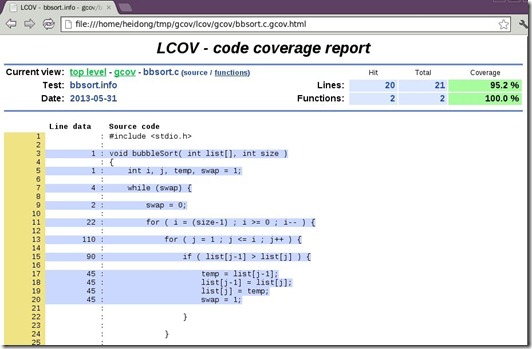gcov 简述
代码覆盖率是单元测试的一个指标,通常覆盖率越高,单元测试就做得更完备。(然而,覆盖率是不是和软件质量成正比关系呢?)gcov是GNU工具链中的一个重要的工具,虽然gcov是覆盖率很好的工具,但是gcov的更重要的应用是性能的调优。gcov通过监视程序的执行,从而确定某行代码有没有执行,执行了多少次。gcov的报告是基于文本的格式的,看起来是比较难看点。但是,有个叫lcov的工具,将gcov的报告格式转换为html的直观形式,后面介绍。
gcov使用:
如有以下代码:
1: #include <stdio.h>
2:
3: void bubbleSort( int list[], int size )
4: {
5: int i, j, temp, swap = 1;
6:
7: while (swap) {
8:
9: swap = 0;
10:
11: for ( i = (size-1) ; i >= 0 ; i-- ) {
12:
13: for ( j = 1 ; j <= i ; j++ ) {
14:
15: if ( list[j-1] > list[j] ) {
16:
17: temp = list[j-1];
18: list[j-1] = list[j];
19: list[j] = temp;
20: swap = 1;
21:
22: }
23:
24: }
25:
26: }
27:
28: }
29:
30:
31: }
32:
33: int main()
34: {
35: int theList[10]={10, 9, 8, 7, 6, 5, 4, 3, 2, 1};
36: int i;
37:
38: /* Invoke the bubble sort algorithm */
39: bubbleSort( theList, 10 );
40:
41: /* Print out the final list */
42: for (i = 0 ; i < 10 ; i++) {
43: printf("%d\n", theList[i]);
44: }
45: if(i == 0){
46: printf("i = 0\n");
47: }else{
48: printf("i != 0\n");
49: }
50:
51: }
-
编译程序是增加 -ftest-coverage -fprofile-arcs 选项。
[heidong@HEIDONGVM gcov]$ GCC -o bbsort bbsort.c -ftest-coverage -fprofile-arcs
生成.gcno文件。
-
执行程序,将生成.gcda文件,用gcov程序检查相应的源代码文件,将生成结果文件。
[heidong@HEIDONGVM gcov]$ ./bbsort 1 2 3 4 5 6 7 8 9 10 i != 0 [heidong@HEIDONGVM gcov]$ gcov bbsort.c File‘bbsort.c’ 已执行的行数:95.24% (共 21 行) bbsort.c:正在创建‘bbsort.c.gcov -
检查相应的结果文件
[heidong@HEIDONGVM gcov]$ cat bbsort.c.gcov -: 0:Source:bbsort.c -: 0:Graph:bbsort.gcno -: 0:Data:bbsort.gcda -: 0:Runs:1 -: 0:Programs:1 -: 1:#include <stdio.h> -: 2: 1: 3:void bubbleSort( int list[], int size ) -: 4:{ 1: 5: int i, j, temp, swap = 1; -: 6: 4: 7: while (swap) { -: 8: 2: 9: swap = 0; -: 10: 22: 11: for ( i = (size-1) ; i >= 0 ; i-- ) { -: 12: 110: 13: for ( j = 1 ; j <= i ; j++ ) { -: 14: 90: 15: if ( list[j-1] > list[j] ) { -: 16: 45: 17: temp = list[j-1]; 45: 18: list[j-1] = list[j]; 45: 19: list[j] = temp; 45: 20: swap = 1; -: 21: -: 22: } -: 23: -: 24: } -: 25: -: 26: } -: 27: -: 28: } -: 29: -: 30: 1: 31:} -: 32: 1: 33:int main() -: 34:{ 1: 35: int theList[10]={10, 9, 8, 7, 6, 5, 4, 3, 2, 1}; -: 36: int i; -: 37: -: 38: /* Invoke the bubble sort algorithm */ 1: 39: bubbleSort( theList, 10 ); -: 40: -: 41: /* Print out the final list */ 11: 42: for (i = 0 ; i < 10 ; i++) { 10: 43: printf("%d\n", theList[i]); -: 44: } 1: 45: if(i == 0){ #####: 46: printf("i = 0\n"); -: 47: }else{ 1: 48: printf("i != 0\n"); -: 49: } -: 50: 1: 51:} -: 52: [heidong@HEIDONGVM gcov]$
可以看到某行执行了多少次,哪些行没有执行过(####标示)。gcov 还可以检查其他很多的信息,如分支,函数等,详细参考gcov的帮助文档,并测试之。
对于文本格式,相信很多人的觉得不是很直观,于是便有了lcov这个工具,它可以算是gcov的前端工具,这样生成html文件,可以很直观的看到代码覆盖情况。
lcov不是标准的unix/Linux工具,需要下载,地址是:ltp.sourceforge.net/coverage/lcov.php 注意要FQ才可以访问。
使用方式:
-
执行完gcov的步骤后,执行下列命令:
[heidong@HEIDONGVM gcov]$ lcov --capture --directory ./ --output-file bbsort.info Capturing coverage data from ./ Found gcov version: 4.4.6 Scanning ./ for .gcda files ... Found 1 data files in ./ Processing bbsort.gcda Finished .info-file creation -
生成html文件:
[heidong@HEIDONGVM gcov]$ genhtml bbsort.info --output-directory ./lcov/ Reading data file bbsort.info Found 1 entries. Found common filename prefix "/home/heidong/tmp" Writing .CSS and .png files. Generating output. Processing file gcov/bbsort.c Writing directory view page. Overall coverage rate: lines......: 95.2% (20 of 21 lines) functions..: 100.0% (2 of 2 functions
看下生成的html文件:

完毕。